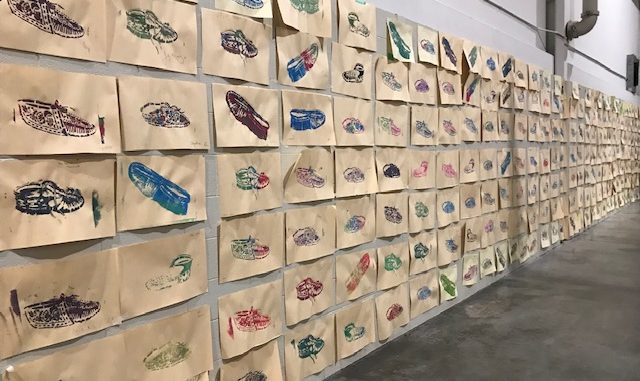
Thanks to a three year Community Partnerships grant, I am part of an Indigenous Action Group coordinating a community-engaged learning course with the Mississaugas of the Credit First Nation (MCFN). The course is being coordinated by a collective made up of MCFN scholars, Indigenous scholars from the University, and settler allies in anthropology and geography. The name “Indigenous Action Group” is intentional because we want to instill change in the post-secondary environment at our Institution. We are not an “advisory group” or a “task force. We are in support of the Truth and Reconciliation Commission of Canada’s (2015) “Calls to Action” and the University of Toronto’s response to those Calls to Action (2016).

The course entitled “Anthropology and Indigenous Peoples of Turtle Island in Canada” is an experiential learning course that has been divided into four general areas:
1. The history of the land and importance of land-based learning (walks on campus, Indigenous medicine and food sustainability, Treaties and wampum belts, archives tour)
2. The importance of culture and language (i.e. moccasin identifier project and ojibwe language revitalization)
3. The ownership of culture (cultural resource management, repatriation, collection & ownership of artifacts, archaeology and cultural identity)
4. Truth and Reconciliation (urban indigeneity in a colonial institution).
Each week different indigenous scholars will spend two hours with the students, and optional field trips will take the students out of the classroom to community events. Similar to many anthropology courses, the course begins with a discussion of positionality and self-reflection. As I have been thinking about this introductory lecture, I have been struck by how the field of anthropology is such a contradiction. Historically, anthropological methods have contributed to the colonization of many Indigenous communities, and yet we seem to portray ourselves as advocates for social justice through our ethnographic methods.
How do we as non-Indigenous settlers avoid recolonization in our attempts to decolonize? Perhaps community-engaged learning (CEL) is an avenue toward changing our discipline. What is community-engaged learning? The Center of Community Partnerships at the University of Toronto describes CEL as “ a collaboration between institutions of higher education and their larger communities for the mutually beneficial exchange of knowledge and resources in a context of partnership and reciprocity” (The Carnegie Foundation, Carnegie Community Engagement Classification). Partnership and reciprocity are the key concepts of CEL, and I think that this aligns with Indigenous research methodologies that emphasize relational responsibility (Wilson, 2008).
With this in mind, perhaps it is time for anthropologists to move from the front of the classroom to the back of the classroom. If we are going to have true reciprocity and respect then we must open up the Academy to different ways of knowing. We as anthropologists should be the first to admit that our own positionality can bias the student learning experience. Instead, I suggest that we can stand behind communities instead of in front of them and support their initiatives in education. Decolonization is a loaded word (see Tuck and Yang, 2012) but perhaps anthropology is a logical place to begin a discussion of changing the student learning experience. The course begins next week, and I am nervous about how it will be received in the Academy. I guess that will be a future blog post…
Sherry Fukuzawa, Assistant Professor, Teaching Stream & Associate Chair, Department of Anthropology, University of Toronto Mississauga
- Truth and Reconciliation Commission of Canada (2015). Truth and Reconciliation commission of Canada: Calls to action, Library and Archives Canada, Winnipeg, Manitoba. Retrieved from: http://www.trc.ca/websites/trcinstitution/File/2015/Findings/Calls_to_Action_English2.pdf
- Tuck, E., & Yang, K. (2012). Decolonization is not a metaphor. Decolonization, Indigeneity, Education & Society, 1,1,1-40.
- University of Toronto Steering Committee (2016). Wecheehetowin: Answering the Call, the University of Toronto’s Response to the Truth and Reconciliation Commission of Canad. https://www.provost.utoronto.ca/wp-content/uploads/sites/155/2018/05/Final-Report-TRC.pdf
- Wilson, S. (2008). Research is ceremony: Indigenous research methods. Fernwood Publishing, Winnipeg, Manitoba.

Leave a Reply
You must be logged in to post a comment.